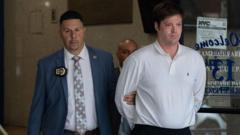Khalid Sheikh Mohammed, accused of orchestrating the 9/11 attacks, faced yet another delay in his plea deal at Guantanamo Bay due to a federal appeals court intervention. As victims' families express frustration over the unfolding legal drama, the case continues to draw scrutiny regarding the implications of an agreement between the defense and prosecutors.
Unraveling the Uncertainty: Khalid Sheikh Mohammed’s Plea Delayed at Guantanamo Bay

Unraveling the Uncertainty: Khalid Sheikh Mohammed’s Plea Delayed at Guantanamo Bay
A pivotal moment in the 9/11 mastermind's case halted once again, raising questions about the legal proceedings and the future of justice linked to America's most infamous terror attack.
Sitting in a military courtroom on the US naval base at Guantanamo Bay, Khalid Sheikh Mohammed, widely recognized as the mastermind behind the September 11 attacks, found himself in a situation that could change the landscape of his trial. During a recent session, the presiding judge asked his legal representative if Mohammed was prepared to plead guilty to all charges without reservations. His lawyer confirmed this intention, setting the stage for what would have been a significant moment in a case that has dragged on for over two decades.
The 59-year-old Mohammed, sporting a bright orange beard and attired in traditional attire, presented a stark contrast to the image of the infamous figure captured in 2003. This plea, pivotal in a case marked by years of delays and legal wrangling, seemed imminent. However, two days before he was to make this formal declaration, court proceedings were unexpectedly interrupted following an emergency request from a federal appeals court, creating further uncertainty in an already complex saga.
For the families of nearly 3,000 victims lost in the 2001 attacks, this latest delay only adds to the emotional rollercoaster they've been enduring. One victim's relative voiced concerns about the chaotic legal back-and-forth, highlighting the distress it causes as families attempt to seek closure. Mohammed's anticipated guilty plea stemmed from a controversial negotiation with prosecutors — intended to spare him from a potential death penalty trial.
This agreement has faced significant pushback from the US government, which argues that proceeding with it could cause irreversible damage to its credibility and public trust. Advocates for the deal argue it remains the best path forward given the challenges of the case, which includes the fallout from the torture of detainees and the integrity of the presented evidence.
The courtroom witnessed a unique scene as families of the victims gathered, having traveled specifically for this moment, only to learn about the delay while already inside a hotel on the base. Elizabeth Miller, who lost her firefighter father on that tragic day, expressed that while she believed in moving forward with the plea deal, the slow resolution process is frustrating for many who crave closure.
This latest chapter only adds to the storied narrative of Guantanamo, where the US has held detainees for over 23 years under military commissions established in the wake of 9/11. The military prison has faced an array of critiques over treatment practices and legality of detentions, with ongoing discussions about potential closure still in play. Although conditions have improved since its inception, the legal status of remaining detainees poses a continued challenge.
The unfolding events at Guantanamo Bay reflect not only the complexities of legal proceedings for one of history's most notorious figures but also the broader implications these proceedings have on the perception of justice and accountability for acts of terrorism that have shaped modern US history. As this situation develops, it is clear that the quest for resolution in the face of extreme injustice continues to be fraught with obstacles and emotional turmoil for those impacted.





















